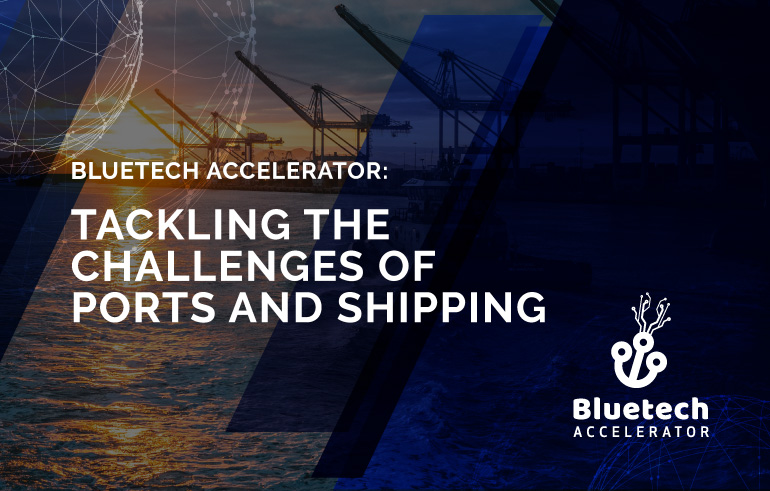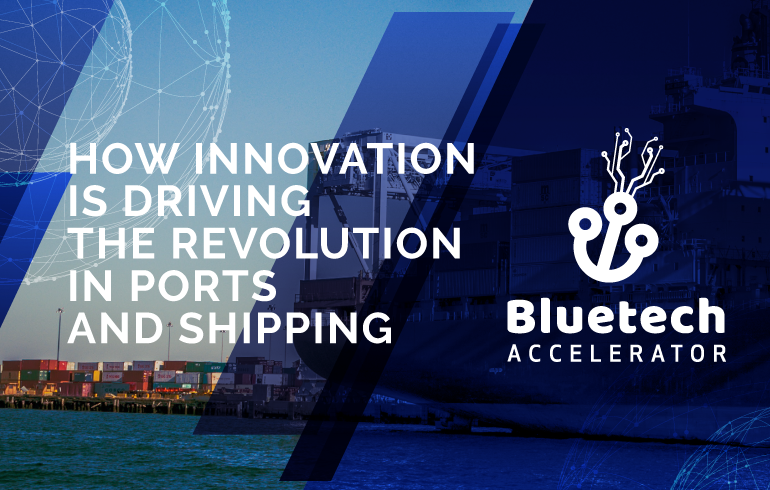
by silvia | Mar 6, 2019 | Corporates, Investors, Startups, Uncategorized
The ports and shipping industry is ready to step into the future. Bluetech accelerator has arrived, looking to build the ports of the future: autonomous systems for ports and smart shipping, with seamless processes between sea and land, digital data that will make decisions easy and informed, and new techs that will allow for environmental sustainability. Ready to be a part of it?
Bluetech Accelerator
Born out of the partnership of the Portuguese Ministry of the Sea and FLAD – Luso-American Development Foundation, and powered by DGPM and Beta-i, Bluetech accelerator aims to connect the most innovative tech and ocean startups with leading players in the industry to create a new blue economy – one that is modern, data-based, technologically advanced and environmentally friendly.
To achieve it, the programme will have 3 editions – Ports and shipping, aquaculture and fishing, and energy and sustainability.
Ports and Shipping
The first edition of the programme will focus on Ports and Shipping 4.0. Innovation is arriving in the industry, and as a strategically positioned country, Portugal has a sea of opportunities: startups joining the programme will work directly with Portugal’s biggest ports, relevant players in the shipping industry and leaders in the mobile satellite communications and digital economy – get to know the Bluetech Pioneers here.
The goal is to work towards the ports of the future: a seamless process of shipping, connection and cargo transport to land and accessible information across the supply-chain.
The challenges
The challenges the program hopes to tackle are:
- Process Optimization in Port Hinterland
- Cargo and Fleet Performance Management
- Future Shipping Connectivity
- Environmental Sustainability
You can read a more detailed description of each of the challenges here.
Tech We’re Looking for
Bluetech Accelerator is looking for startups technologies ranging from smart shipping and sea surveillance to big data and analytics. Get to know all the technologies Bluetech is looking for here.
A whole new generation of ocean startups
The challenges presented by the program, are relevant all around the world and can be industry changing. Today is more important than ever to work on changing vital industries to be more efficient, more connected and more sustainable, to better serve our economy and our planet.
Bluetech aims to build a new generation of ocean startups that will be the catalyst of this change and the builders of a modern ocean economy.
Get to know more about the programme here.

by silvia | Feb 19, 2019 | Corporates, Investors, Startups, Uncategorized
Often seen as a stagnated industry, the ports and shipping industry is now waking up to the challenges they face, and the new opportunities based on technology that is in their reach. Their importance in the geo-spatial economy is now as important as it was in the Silk Route Map.
Why is the ports revolution happening now?
- Pollution: It is, unsurprisingly, the biggest motivator towards the necessity to innovate in this area. Although it has been banned in every other industry, the shipping industry is still allowed dangerous low-grade, high-sulfur fuels (cheaper than low-sulfur fuels) – it produces 13% of the world’s sulfur emissions and 15% of nitrogen oxides.
- Regulation: Health is the main concern behind the International Maritime Organization’s decision to slash the permitted sulfur content in ships’ fuel from 3.5 to 0.5 percent. It is estimated that shipping’s cheap fuels cause around 400,000 premature deaths a year through heart and lung diseases and asthma in 14 million children, and the use of cleaner fuels could reduce these number by half.
- Ocean protection: The world has awakened to the destruction of our oceans and maritime life, and its implications in the economy.
- Maritime accidents: the need for using technology to reduce and extinguish maritime accidents that result in the loss of money, life and maritime species.
Three big innovation trends emerging
Autonomous shipping
The biggest impact of tech in shipping will have to do with the automation of shipping and autonomous ships. 78% of maritime professionals expect the first autonomous ships in the next 10 years and 56% believe that autonomous ships will be commonly deployed in merchant shipping in the next 11 to 20 years.
Autonomous shipping would bring great benefits to the industry: they could serve isolated islands, inhospitable routes navigated and remote areas accessed, much of it with diminished risk to seafarers. And since 80% of maritime accidents are the result of human error, autonomous shipping would be a safer solution than crewed shipping.
Ports of the future
It’s safe to say that the ports industry is no longer a stagnated one. Ports are becoming hubs connecting sea and land and striving for efficiency, supporting customers, promoting frictionless trade and enabling highly efficient processes for cargo movement. The goal is clear: to maximize efficiency and support international supply chains.
“Modern ports have become multimodal distribution megahubs which link sea, river, canal, road, rail and air transport routes, vital for international trade and linchpins for the global economy.”
Racounter.net
Digital & Robotics
Digitization in its many forms will be a key asset of the revolution happening in ports and shipping. Data, information and how it’s handled will be at the core of the way ports operate in the future.
Not only robotics will take physical tasks away from humans (directing them towards more safe and high skilled jobs), they will also embark on tasks that cannot be undertaken by humans (deep-sea exploring, for example).
Complex systems of Internet of Things (IoT) sensors to collect data around tidal streams, wind strength and visibility, will help reduce vessel waiting times and automatically guide crewless ships. The availability of such data-driven analytics increases operational efficiency by improving tactical decisions. Further uses of such technology include providing shippers with greater visibility into market and pricing trends and helping minimize the dramatic boom-and-bust cycles that have traditionally plagued the industry.
The importance of the Blue Economy
The revolution in ports and shipping is closely connected to the desire to drive the blue economy. The blue economy represents the exploitation of ocean resources and preservation of the marine environment for economic growth. According to the Foresight Future of the Sea Report, the gross value added of the blue economy is projected to double to $3 trillion by 2030. This value is linked to industries such as trade, tourism, aquaculture and renewable energy.
The benefits of this growth are important to sea connected countries: the creation of jobs, reducing poverty and building resilience against environmental challenges, like natural disasters and climate change.
Stay update on more Blue Economy news – subscribe to our newsletter.


